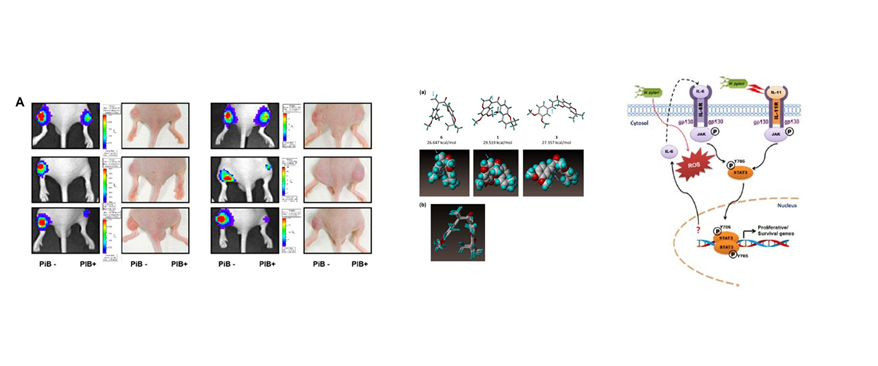Multi-stage carcinogenesis, Chemoprevention
Prof. Young-Joon Surh
Current Research Interests
Multi-stage carcinogenesis
Due to the increase in average lifespan, industrialization and changes in living environments, the incidence of cancer is increasing as a global aspect. According to recent statistics of WHO, over 10 million new cancer patients occur every year throughout the world. In the case of the US, approximately 13 million new cancer patients occurred this year and nearly 550 thousand patients are estimated to die every year. Meanwhile, as the average lifespan is increasing and life patterns including dietary habits are being westernized, the number of cancer patients is increasing in Korea and the incidence rate and patterns of various cancers are gradually changing to that of advanced nations. Already, cancer ranks top as the cause of death in Korean adults.
Since the mid-1970s, the oncogenes that cause cancer and the tumor suppressor genes that control oncogenesis have been discovered and their functions revealed, and our understanding of oncogenesis and cancer progress is going through revolutionary changes. However, cancer is still known as a disease that is difficult to treat and a magic bullet that can neutralize cancer cells hasn’t been developed yet. As with other illnesses, prevention can be the best treatment for cancer. Significant parts of the cause of cancer have been verified through previous epidemiologic studies and lab experiments. A primary way to prevent cancer is to avoid or reduce exposure to previously-known carcinogens, but as this can demand rapid changes in living habits, it can be difficult to practice.
Oncogenesis is a multi-step process of initiation, promotion and progression. Initiation can occur in a very short time, and as the DNA or cell that has mutated in the initiation step is a non-reversible process, blocking initiation alone is not sufficient to prevent cancer. However, promotion is a reversible process that generally takes over 10 years, and the process can not only be blocked or delayed by taking cancer-preventive pharmaceutical foods, but also can reverse cancer cells to normal cells in some cases (Fig. 1). Progression is a non-reversible process where some of the benign tumor cells transform and infiltrate and metastasize to other tissues. Therefore, in order to expect preventive effects, it would be most effective to inhibit or reverse the promotion phase which is a reversible process.
Even though enormous investment has been made globally during the past 30 years in order to discover the cause and treatment of cancer, the incidence rate and mortality rate due to cancer has not been reduced. Therefore, prevention is being emphasized as a countermeasure for cancer, and especially, as NSAIDs (Non-steroidal anti-inflammatory drugs) such as aspirin have been reported to have preventive effects for cancer, chemoprevention is rising as new strategy in reducing the incidence and mortality rates that inhibit and control the cancerization process using toxin-free safe compounds. Unlike chemotherapy using antitumor agents in patients, special safety precautions are required since chemoprevention primarily targets the normal population. Therefore, chemical compounds that originate from several plants and foods verified for safety are advisable as potential cancer-preventive materials.
Chemoprevention
Previously, Richard Doll and Richard Peto have reported that approximately 35% of human cancers are related to food. As an example that backs the relationship between food and cancer, the incidence rates of colon cancer and breast cancer is high in North America and Europe where meat and fat uptake is high, while on the contrary, the incidence rates are relatively low in South America and Asia where the principle foods are grains and vegetables. Some carcinogens that originate from food cause tumors when injected in animals and stimulate proliferation and metastasis of cancer cells. However, the foods we eat have multiple components that can inhibit oncogenesis and cancerization. Evidence is being accumulated through several clinical, epidemiological and basic studies showing the inverse proportion between cancer incidence rates and uptake of fruit and vegetables.
The US is conducting the “Five-A-Day for Better Health” campaign since 1991 which intends to prevent cancer as well as various adult diseases by eating fruit and vegetables over five times a day, and the US is actually seeing the effects. The NCI, American Cancer Society, American Institute of Cancer Research, several nonprofit consumer foundations, volunteer organizations and the food industry are participating in this nationwide campaign. In 1991, when this campaign was first initiated, only 8% of Americans ate more than 5 servings a day of fruit and vegetables (serving: 1 serving equals half of an apple or a cup of juice), but now, 36% of Americans, 5 times that of 1991, are participating in the campaign. Along with the “Five-A-Day for Better Health” program, the US is also conducting the “Savor the Spectrum” movement since 2002 so that more Americans take more fruits and vegetables more often. Meanwhile, the NCI has prepared a guideline that is composed of fruits and vegetables of various spectrums. According to the NCI, over approximately 40 types of plant-originated foods have been confirmed to have preventive effects in cancer. For example, garlic, beans, ginger, cabbage, broccoli and tomatoes have been confirmed to have effects in preventing cancer. Also, many epidemiologic studies showed that macronutrients such as carbohydrates or fibers, or micronutrients such as vitamin or minerals can lower cancer incidence rates. In particular, antioxidant vitamins (Vit. A, Vit. C. and Vit. E) and provitamins such as beta carotene which are abundant in yellow and green vegetables are well known to have cancer-preventive effects.
